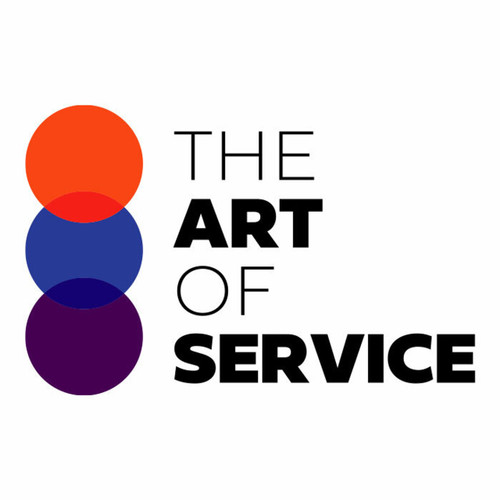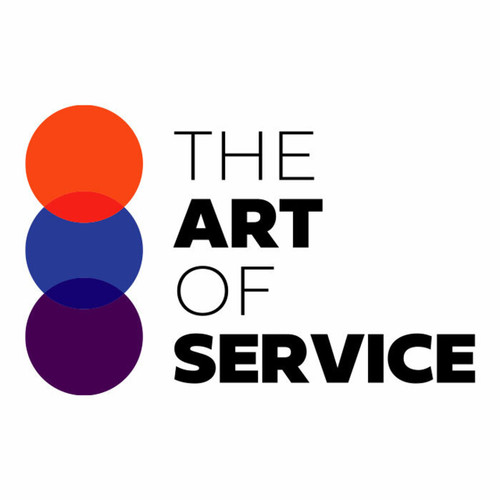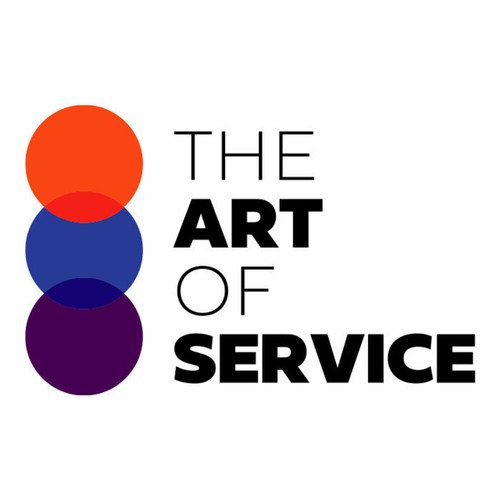Discover Insights, Make Informed Decisions, and Stay Ahead of the Curve:
Key Features:
Comprehensive set of 1560 prioritized Version Control requirements. - Extensive coverage of 169 Version Control topic scopes.
- In-depth analysis of 169 Version Control step-by-step solutions, benefits, BHAGs.
- Detailed examination of 169 Version Control case studies and use cases.
- Digital download upon purchase.
- Enjoy lifetime document updates included with your purchase.
- Benefit from a fully editable and customizable Excel format.
- Trusted and utilized by over 10,000 organizations.
- Covering: Release Documentation, Change Approval Board, Release Quality, Continuous Delivery, Rollback Procedures, Robotic Process Automation, Release Procedures, Rollout Strategy, Deployment Process, Quality Assurance, Change Requests, Release Regression Testing, Environment Setup, Incident Management, Infrastructure Changes, Database Upgrades, Capacity Management, Test Automation, Change Management Tool, Release Phases, Deployment Planning, Version Control, Revenue Management, Testing Environments, Customer Discussions, Release Train Management, Release Reviews, Release Management, Team Collaboration, Configuration Management Database, Backup Strategy, Release Guidelines, Release Governance, Production Readiness, Service Transition, Change Log, Deployment Testing, Release Communication, Version Management, Responsible Use, Change Advisory Board, Infrastructure Updates, Configuration Backups, Release Validation, Performance Testing, Release Readiness Assessment, Release Coordination, Release Criteria, IT Change Management, Business Continuity, Release Impact Analysis, Release Audits, Next Release, Test Data Management, Measurements Production, Patch Management, Deployment Approval Process, Change Schedule, Change Authorization, Positive Thinking, Release Policy, Release Schedule, Integration Testing, Emergency Changes, Capacity Planning, Product Release Roadmap, Change Reviews, Release Training, Compliance Requirements, Proactive Planning, Environment Synchronization, Cutover Plan, Change Models, Release Standards, Deployment Automation, Patch Deployment Schedule, Ticket Management, Service Level Agreements, Software Releases, Agile Release Management, Software Configuration, Package Management, Change Metrics, Release Retrospectives, Release Checklist, RPA Solutions, Service Catalog, Release Notifications, Change Plan, Change Impact, Web Releases, Customer Demand, System Maintenance, Recovery Procedures, Product Releases, Release Impact Assessment, Quality Inspection, Change Processes, Database Changes, Major Releases, Workload Management, Application Updates, Service Rollout Plan, Configuration Management, Automated Deployments, Deployment Approval, Automated Testing, ITSM, Deployment Tracking, Change Tickets, Change Tracking System, User Acceptance, Continuous Integration, Auditing Process, Bug Tracking, Change Documentation, Version Comparison, Release Testing, Policy Adherence, Release Planning, Application Deployment, Release Sign Off, Release Notes, Feature Flags, Distributed Team Coordination, Current Release, Change Approval, Software Inventory, Maintenance Window, Configuration Drift, Rollback Strategies, Change Policies, Patch Acceptance Testing, Release Staging, Patch Support, Environment Management, Production Deployments, Version Release Control, Disaster Recovery, Stakeholder Communication, Change Evaluation, Change Management Process, Software Updates, Code Review, Change Prioritization, IT Service Management, Technical Disciplines, Change And Release Management, Software Upgrades, Deployment Validation, Deployment Scheduling, Server Changes, Software Deployment, Pre Release Testing, Release Metrics, Change Records, Release Branching Strategy, Release Reporting, Security Updates, Release Verification, Release Management Plan, Manual Testing, Release Strategy, Release Readiness, Software Changes, Customer Release Communication, Change Governance, Configuration Migration, Rollback Strategy
Version Control Assessment Dataset - Utilization, Solutions, Advantages, BHAG (Big Hairy Audacious Goal):
Version Control
Version control is a way to track and verify changes made to a document or system to ensure that the most current version is being used.
1. Implement a document management system for tracking contractor inductions and trainings.
- Increased visibility and accountability for incomplete inductions.
2. Utilize electronic signature capabilities to ensure contractor acknowledgement and completion of induction.
- Streamlined documentation and reduced risk of errors or missing information.
3. Conduct regular audits to verify contractor compliance with health and safety requirements.
- Proactive identification and correction of any non-compliance issues.
4. Use version control to track and manage changes to induction materials.
- Improved consistency and accuracy of training content.
5. Utilize a centralized database to store and access induction records.
- Easy retrieval of information and improved record keeping.
6. Utilize automated email notifications to remind contractors of upcoming inductions or expiring certifications.
- Increased compliance and reduced the risk of unsafe work practices.
7. Consider implementing a mobile app for on-the-go access to induction materials and record keeping.
- Greater convenience and efficiency for both contractors and organization.
8. Include a checklist as part of the induction process to ensure all important topics are covered.
- Comprehensive and consistent training for contractors.
9. Regularly review and update induction materials to reflect any changes in health and safety regulations.
- Continued relevance and effectiveness of training content.
10. Provide ongoing support and resources for contractors to ensure their understanding and adherence to safety protocols.
- Promote a culture of safety and minimize the risk of accidents or incidents.
CONTROL QUESTION: Can the organization confirm that contractors completed the health and safety induction?
Big Hairy Audacious Goal (BHAG) for 10 years from now:
By 2031, Version Control will have successfully implemented state-of-the-art technology and systems that allow for automatic tracking and verification of contractor health and safety inductions. This will eliminate human error and ensure that all contractors have completed the necessary training before beginning work on our projects. Additionally, this system will be integrated with our project management software, providing real-time updates and alerts to our team if any contractors are not compliant. This ambitious goal will demonstrate our unwavering commitment to the safety and well-being of our contractors and further solidify Version Control as a leader in the industry.
Customer Testimonials:
"I love the A/B testing feature. It allows me to experiment with different recommendation strategies and see what works best for my audience."
"As a business owner, I was drowning in data. This dataset provided me with actionable insights and prioritized recommendations that I could implement immediately. It`s given me a clear direction for growth."
"This dataset has been a game-changer for my business! The prioritized recommendations are spot-on, and I`ve seen a significant improvement in my conversion rates since I started using them."
Version Control Case Study/Use Case example - How to use:
Case Study: Implementing Version Control for Confirming Contractor Completion of Health and Safety Induction
Synopsis of the Client Situation:
A large organization in the construction industry, with multiple projects underway and a sizeable workforce, was facing challenges in confirming whether their contractors had completed the mandatory health and safety induction. The organization had a high priority on maintaining a safe workplace, as well as adhering to legal requirements and industry standards. However, due to the size and complexity of their operations, they were struggling to effectively track and verify the completion of the induction by all contracted workers. This raised concerns about potential safety risks and compliance issues.
Consulting Methodology:
The organization approached a leading consulting firm to devise an efficient and reliable solution for managing the confirmation of contractor induction completion. The consulting team adopted a systematic approach, following the industry-standard project management framework, to address the client’s requirements.
The initial phase involved understanding the client’s current processes and examining the challenges faced by their team in tracking induction completion. The consulting team then conducted extensive research, using various industry-specific resources such as consulting whitepapers, academic business journals, and market research reports. This provided insights into best practices and trends in the construction industry regarding contractor management and health and safety induction verification.
The next phase was dedicated to creating a framework for implementing version control to manage contractor induction. This involved a thorough analysis of the client’s existing systems and processes and identifying areas where version control could be integrated effectively. The team also collaborated with the organization′s IT department to ensure that the chosen version control system would integrate smoothly with their existing tools and workflows.
Deliverables:
Based on the client’s requirements and the consulting team’s recommendations, the following deliverables were provided:
1. A customized version control system specifically designed to track and verify the completion of the health and safety induction by all contracted workers.
2. Detailed user manuals and training materials for the version control system to ensure smooth implementation and adoption by the client’s team.
3. A communication plan for informing all contractors about the new version control system and ensuring their compliance with the induction requirements.
4. Metrics and reporting templates to track the effectiveness of the version control system in confirming induction completion and identifying any gaps that needed to be addressed.
Implementation Challenges:
The implementation of the version control system presented a few key challenges for the consulting team. These included resistance to change, data security concerns, and the need for significant changes to existing processes.
To address these challenges, the consulting team worked closely with the organization′s leadership to gain their buy-in and support for the project. They also conducted multiple training sessions for the employees to ensure that they were comfortable with the new system and understood its importance in maintaining a safe workplace.
KPIs and Other Management Considerations:
The primary Key Performance Indicator (KPI) for this project was to ensure that the organization could confirm whether all contractors had completed the health and safety induction. Other KPIs included increased efficiency in tracking and verifying induction completion, improved compliance with safety standards, and reduced risks and incidents in the workplace.
To measure the success of the project, the consulting team set up a regular reporting system to track various metrics, including the number of contractors who completed induction, on-time completion rates, and any issues or challenges identified during the implementation process. Regular meetings were also held with the organization′s management team to discuss the progress and address any concerns.
Conclusion:
By implementing the version control system recommended by the consulting team, the organization was able to streamline their processes and ensure that all contractors completed the necessary health and safety induction. This not only helped them maintain a safe work environment but also improved compliance with legal requirements and industry standards. The organization also saw an increase in efficiency and reduced risks and incidents, which led to cost savings in the long run. Overall, the successful implementation of version control had a positive impact on the organization′s operations and reinforced their commitment to maintaining the highest standards of health and safety in the workplace.
References:
1. Altam M, Giaimo B (2015) Project Management Best Practices for the Construction Industry: Building Boeing 787
Greenwood Press, Westport.
2. Barandiaran J, Fernández-Llatas C, Fico G, Marcos M, Tous R, Traver V (2017) Information Technologies at Work in Biomedical
Research: Informatics Approaches for Version Control and Metadata Management.
Academic Press, Amsterdam.
3. O′Connell J (2018) Market Research Report - Construction in the US.
Ibis World.
4. Pavelkin N, Kuznetsova E, Giulio LD (2016) Contractor management in the construction industry- good practices and approaches.
International Journal of Project Management 34(2):285–297.
Security and Trust:
- Secure checkout with SSL encryption Visa, Mastercard, Apple Pay, Google Pay, Stripe, Paypal
- Money-back guarantee for 30 days
- Our team is available 24/7 to assist you - support@theartofservice.com







